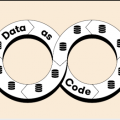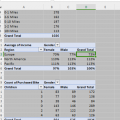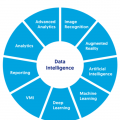- February 21, 2024
- Posted by: SouTech Team
- Category: Others

In the fast-paced world of data-driven decision-making, finding a sense of serenity amidst the overwhelming sea of information can be challenging. Welcome to the realm of Data Analysis Zen, where efficiency meets mindfulness, and insights are discovered with tranquility. This article explores the importance of data analysis, strategies for achieving Zen in data analysis, and real-life applications that demonstrate the profound impact of a balanced and focused approach.
- Introduction
In a digitally dominated era, data has become the currency of the modern world. Organizations and individuals are swimming in a sea of information, seeking meaningful insights that can drive success. But how do we navigate this vast ocean without succumbing to the waves of complexity and ambiguity? Enter Data Analysis Zen – the art of finding serenity through mindful data interpretation.
- The Importance of Data Analysis
Data analysis is the key to unlocking valuable insights from raw information. Whether you’re a business executive making strategic decisions or an individual tracking personal productivity, data analysis empowers informed choices. Understanding its significance is the first step towards achieving a state of Zen in the analytical process.
- Navigating the Sea of Information
3.1 Understanding Data Overload
The sheer volume of data available can be overwhelming. We’ll explore the challenges posed by data overload and how it can hinder the decision-making process.
3.2 Tools for Efficient Data Analysis
Discover the arsenal of tools available for efficient data analysis, ranging from spreadsheet software to advanced data visualization platforms.
- Achieving Zen in Data Analysis
4.1 Clear Objectives and Goals
Setting clear objectives and goals is the foundation of a Zen-like approach to data analysis. We delve into the importance of defining purpose before diving into the data.
4.2 Streamlining Data Sources
In the quest for serenity, streamlining data sources is crucial. We discuss strategies for managing and integrating diverse data streams seamlessly.
4.3 Embracing Simplicity in Visualization
Simplicity in data visualization is an art. Learn how to communicate complex insights with clarity and elegance, fostering a Zen experience for both analysts and stakeholders.
- Mindful Interpretation of Results
Interpreting data results with mindfulness ensures a deeper understanding of the implications. We explore the significance of taking a step back and reflecting on the meaning behind the numbers.
- Overcoming Analysis Paralysis
Analysis paralysis can hinder decision-making. Discover practical tips to overcome the paralysis that comes with an abundance of data choices.
- The Role of Continuous Learning
7.1 Staying Updated with Industry Trends
The world of data is ever-evolving. Stay ahead by exploring the importance of staying updated with the latest industry trends and technological advancements.
7.2 Investing in Skill Development
Continuous learning is the backbone of Data Analysis Zen. We discuss the significance of investing in skill development to remain proficient in the field.
- Real-Life Applications of Data Analysis Zen
8.1 Business Decision-Making
Explore how businesses leverage Data Analysis Zen to make informed decisions that impact their bottom line positively.
8.2 Personal Productivity
On a personal level, see how adopting a Zen mindset in data analysis can enhance productivity and decision-making in daily life.
- Challenges in Attaining Data Analysis Zen
9.1 Data Security Concerns
With great data comes great responsibility. We address the concerns related to data security and maintaining the confidentiality of sensitive information.
9.2 Balancing Speed and Accuracy
The delicate balance between speed and accuracy in data analysis is explored, providing insights into managing this critical aspect effectively.
- Tips for Beginners
10.1 Start Small, Gain Confidence
For those new to the world of data analysis, starting small is the key to building confidence. We provide actionable tips for beginners.
10.2 Collaborate and Seek Guidance
Collaboration and seeking guidance from experienced professionals can accelerate the learning curve. Discover the power of collective wisdom in the data analysis journey.
- Case Studies: Stories of Data Analysis Zen
Explore real-world case studies that showcase the transformative power of Data Analysis Zen in diverse scenarios.
- The Future of Data Analysis
12.1 Integration of AI and Machine Learning
The future of data analysis is intertwined with artificial intelligence and machine learning. Understand how these technologies will shape the landscape of data analysis.
12.2 Emerging Trends in Data Analysis
Stay ahead of the curve by exploring the emerging trends that will define the next frontier of data analysis.
- Conclusion
In the pursuit of Data Analysis Zen, the journey is as important as the destination. By understanding the challenges, embracing simplicity, and continuously evolving our skills, we can navigate the sea of information with clarity and purpose.
- FAQs
14.1 How can I start learning data analysis?
Embark on your data analysis journey by starting with online courses, workshops, or tutorials. Practice with real-world datasets to apply theoretical knowledge.
14.2 Is data analysis only for professionals in the IT field?
No, data analysis is a valuable skill for professionals across various industries, including marketing, finance, healthcare, and more.
14.3 What are the common challenges faced in data analysis?
Common challenges include data overload, analysis paralysis, and balancing speed and accuracy in decision-making.
14.4 Can data analysis be applied in non-business contexts?
Absolutely. Data analysis is versatile and can be applied in personal projects, research, and various
non-business contexts to gain valuable insights.
14.5 How often should one update their data analysis skills?
Given the rapid evolution of technology, it’s advisable to update your data analysis skills regularly. Aim for continuous learning to stay relevant in the field.





